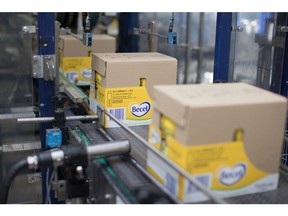Upfield aims to reach net-zero carbon emissions across its operations and supply chain by 2050 — 11 years later than its former parent Unilever.

Article content
(Bloomberg) — When Unilever Plc sold its plant-based spreads business to private equity firm KKR & Co. Inc. in 2018, the consumer-goods giant effectively wiped more than 3 million tons of carbon off its ledger. Now those emissions are set to stick around for an extra decade.
Advertisement 2
Article content
Upfield, which makes plant-based spreads under the Flora, Becel and Country Crock brands, said in an ESG summary released earlier this month that it aims to reach net-zero carbon emissions across its operations and supply chain by 2050. That’s a less stringent target than the one Upfield would have been aiming for had it remained part of Unilever: to reach net zero by 2039.
Article content
KKR paid €6.8 billion ($8.1 billion) to acquire Upfield from Unilever, which sold the unit under pressure from investors to accelerate growth and increase profitability after an abortive takeover attempt by US rival Kraft Heinz Co. The spreads unit brought in cash, but didn’t fit with Unilever’s strategy of focusing on trendier, faster-growing businesses. The 93-year-old company makes everything from Dove soap to Magnum ice cream.
Article content
Advertisement 3
Article content
Divesting a high-emitting asset can also be a quick way for companies to show they are making progress toward net-zero goals, albeit one that risks shifting emissions to an owner with different plans for how or whether to address them. A Unilever spokesperson said that in 2016, the company’s spreads business was less carbon-intensive than the average of its businesses.
After the acquisition, Upfield redrew its climate roadmap from scratch, says Sally Smith, the company’s global director of sustainability and ESG. KKR also initiated a lengthy overhaul of Upfield’s operations, and spent more than €1.5 billion upgrading systems, products and supply chains, including acquiring plant-based cheese business Violife for €500 million.
Advertisement 4
Article content
Upfield has pledged to be net zero across its own operations by 2030, but the bulk of the company’s supply-chain emissions come from agricultural raw materials, where reductions will require adjustments from multiple suppliers in different countries. Last year, Upfield reduced emissions from operations and its supply chain by 12%, and Smith says those reductions will accelerate moving forward thanks to recent investments.
“In 2022 we saw investment behind some of the big transformations that will start to bear fruit,” she says, referencing initiatives that include a new boiler at a site in Poland. “There’s a whole list of more than 100 projects across our factories and facilities to make sure that we drive energy consumption, carbon transformation, the reduction in the use of energy and electricity and then making sure we use more and more efficient technologies as we move forward.”
Advertisement 5
Article content
Since 2018, revenue at Upfield has largely stagnated. The company reported sales of €3.4 billion in 2022, up only slightly from the €3 billion that Unilever generated from the division in 2016. KKR’s turnaround efforts are complicated by inflation’s impact on the cost of agricultural products like sunflower oil.
Upfield is also affected by conflicting research on the healthiness of plant-based spreads. These products typically contain less saturated fat than their dairy counterparts, but consumers have been deterred by the processing and emulsifiers involved in making them. Upfield wants to emphasize that its spreads are better for the planet — butter and cheese have a much bigger methane footprint, because livestock have high methane emissions — but that’s been a tough leading selling point for makers of plant-based meat.
Smith, for her part, is bullish on plant-based products. “It’s like being the wind turbine of the food sector or the electric car of the food sector,” she says. “Plant-based diets are key to a sustainable future and the plant-based sector, like renewable energy, needs to grow rapidly for the Paris Agreement to be met.”
—With assistance from Akshat Rathi.
Stay connected with us on social media platform for instant update click here to join our Twitter, & Facebook
We are now on Telegram. Click here to join our channel (@TechiUpdate) and stay updated with the latest Technology headlines.
For all the latest Business News Click Here
For the latest news and updates, follow us on Google News.


Comments
Postmedia is committed to maintaining a lively but civil forum for discussion and encourage all readers to share their views on our articles. Comments may take up to an hour for moderation before appearing on the site. We ask you to keep your comments relevant and respectful. We have enabled email notifications—you will now receive an email if you receive a reply to your comment, there is an update to a comment thread you follow or if a user you follow comments. Visit our Community Guidelines for more information and details on how to adjust your email settings.
Join the Conversation